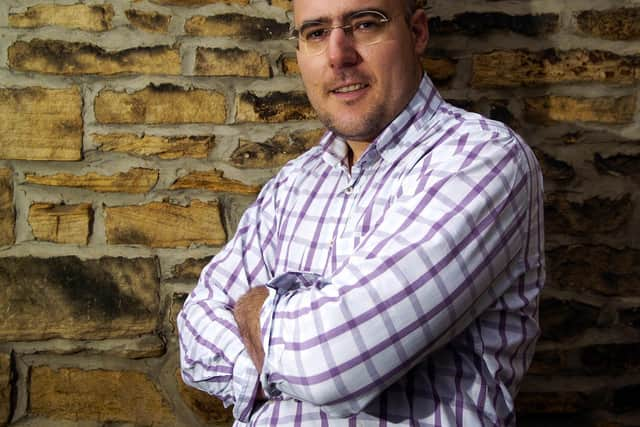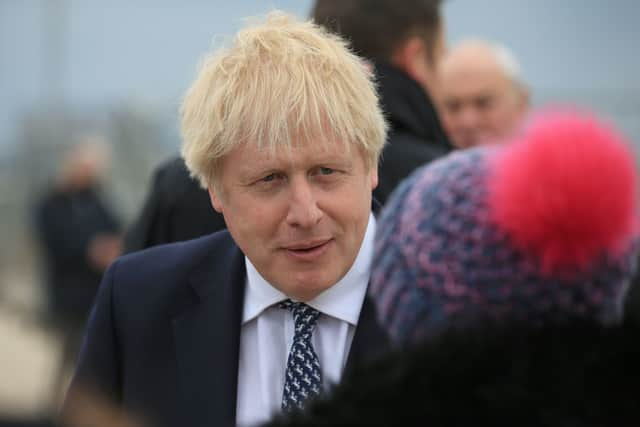Why Teflon Boris Johnson is election one-off – Matthew Flinders
‘Where did it all go wrong?’ he may well be wondering ask as he bounces baby Wilfred in the plush surroundings of his Downing Street flat.
One minute he was enjoying seeing David Cameron (never a friend, always a rival) being skewered over accusations of dubious behaviour, and the next thing Boris is suddenly at the centre of a mighty kerfuffle concerning what he might or might not have said about ‘bodies piling up’, about what he may or may not have texted about ventilators, and what he has or has not paid to spruce up young Wilfred’s playroom.
Advertisement
Hide AdAdvertisement
Hide AdA week really is a long time in politics but the question when it comes to Boris (arguably the most Teflon-coated politician in British political history) is whether the accusations of sleaze will stick ahead of today’s local elections?


Three thoughts. The first is that I cannot help but wonder if the public gets the politicians it deserves.
Boris Johnson demonstrated a litany of ethically dubious behaviour in his personal and professional life long before he became prime minister in 2019.
One of the most striking and slightly endearing features of Boris Johnson’s personality is that he is so absolutely hopeless at trying to hide his indiscretions, foibles and weaknesses.
Advertisement
Hide AdAdvertisement
Hide AdIt’s therefore pretty hard to be surprised that he may (or may not) have initially attempted to get someone else to pay for his building work.


(Note to Boris: Lesson of the week, Never use a wasps’ nest as a punch bag. Leave Dominic Cummings alone. He knows far too much and has nothing to lose).
My second thought is that, when all is said and done, we are not seeing the beginning of the end of Boris Johnson.
While huge ladles of scorn are being poured upon his tousled thatch of blond ambition, I expect very little to stick.
Advertisement
Hide AdAdvertisement
Hide AdGiven how turbulent British politics has become, such predictions must be surrounded in sub-clauses and caveats.


But recent surveys suggest that the sleaze-allegations are not breaking through in a way that is damaging BoJo’s position.
This could change, but my sense is that a double-dynamic is almost holding Alexander Boris DePfeffel Johnson in place.
The first element is that he appears able to sustain an element of, if not confidence, then certainly popularity amongst significant sections of the English public.
Advertisement
Hide AdAdvertisement
Hide AdThis is the ‘x-factor’ component of Boris Johnson that is difficult to explain: even people who don’t actually like Boris still appear to want him to succeed.
Add to this a second party political dimension and the apparent weakness of the official opposition.
Sir Keir Starmer, to put it politely, is struggling.
Which brings me to a third thought about the stickiness of sleaze.
The centrality of Covid-19 over the last year or so has made it incredibly difficult for Labour frontbenchers to secure airtime, and added to that has been Keir Starmer’s need to tread a very narrow line between loyalty to the national effort while also opposing the Government.
Advertisement
Hide AdAdvertisement
Hide AdIn this context, the great temptation for the leader of any opposition is to jump on the sleaze-wheeze from a great height and seek to create the perception amongst the public that the whole government is totally corrupt and dishonest.
This is a temptation that must be resisted.
Spreading accusations of sleaze is the political equivalent of napalm, it taints and tarnishes the whole political system and risks further reducing public confidence in politicians, political processes and political institutions. There is no need to drain the swamp, very few snouts are actually in the trough.
Once spread about liberally accusations of sleaze, like muck and other smelly substances, tend to coat everyone and everything – the bad smell hangs around and lingers long after the events that first triggered it have passed.
Boris’s biggest political enemy has always been himself but the refurbishment of No.11 is unlikely to bring him down or trigger his descent from high office.
Advertisement
Hide AdAdvertisement
Hide AdOnly when the public express themselves today will we have any real indication of whether any of the accusations have struck home.
Why do I sense yet another Boris bounce back?
Matthew Flinders is a professor of politics at the University of Sheffield.
Support The Yorkshire Post and become a subscriber today. Your subscription will help us to continue to bring quality news to the people of Yorkshire. In return, you’ll see fewer ads on site, get free access to our app and receive exclusive members-only offers. Click here to subscribe.
Comment Guidelines
National World encourages reader discussion on our stories. User feedback, insights and back-and-forth exchanges add a rich layer of context to reporting. Please review our Community Guidelines before commenting.